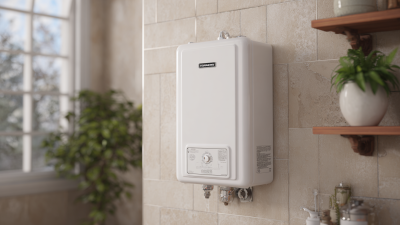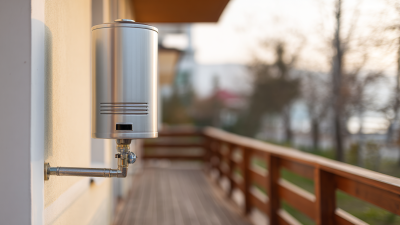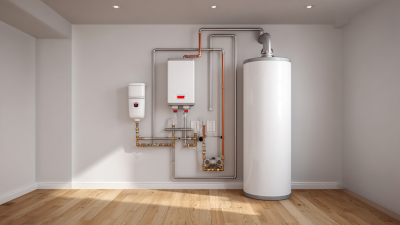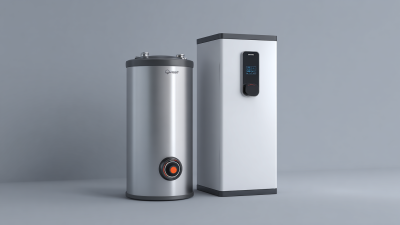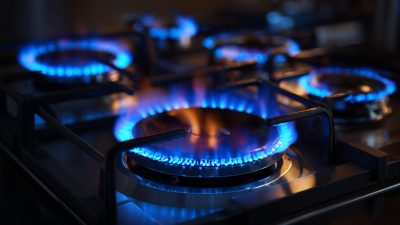
 In the quest for efficient and reliable hot water solutions, the debate between Outdoor Water Gas Heaters and their electric counterparts continues to gain traction among homeowners and industry experts alike. A recent report by the U.S. Department of Energy highlights that water heating accounts for approximately 18% of a home's energy use, making the choice of heater crucial for both energy efficiency and cost savings.
Outdoor Water Gas Heaters, known for their rapid heating capabilities and lower operating costs, often emerge as the preferred option in regions with ample gas supply. Meanwhile, electric alternatives offer convenience and ease of installation, appealing to consumers seeking low-maintenance solutions. As we delve into the advantages and disadvantages of each type, understanding the nuances of performance, efficiency ratings, and environmental impact will help determine which option reigns supreme in this ultimate showdown.
In the quest for efficient and reliable hot water solutions, the debate between Outdoor Water Gas Heaters and their electric counterparts continues to gain traction among homeowners and industry experts alike. A recent report by the U.S. Department of Energy highlights that water heating accounts for approximately 18% of a home's energy use, making the choice of heater crucial for both energy efficiency and cost savings.
Outdoor Water Gas Heaters, known for their rapid heating capabilities and lower operating costs, often emerge as the preferred option in regions with ample gas supply. Meanwhile, electric alternatives offer convenience and ease of installation, appealing to consumers seeking low-maintenance solutions. As we delve into the advantages and disadvantages of each type, understanding the nuances of performance, efficiency ratings, and environmental impact will help determine which option reigns supreme in this ultimate showdown.
When it comes to outdoor water heating, the choice between gas and electric models hinges significantly on energy efficiency. Gas heaters typically boast a higher energy output, heating water more quickly and effectively than their electric counterparts. They utilize propane or natural gas, which can be more cost-effective in areas where gas prices are lower. This means that if you frequently host gatherings or enjoy extended outdoor activities, a gas heater may provide the rapid hot water delivery you need, thereby potentially lowering your overall energy costs in the long run.
On the other hand, electric outdoor heaters offer their own set of advantages, particularly in terms of installation and maintenance. They are generally easier to install and require less upkeep, as they don’t produce exhaust gases and thus avoid the complexities associated with venting. Additionally, many electric models are designed with advanced energy-saving features and can be more environmentally friendly, especially when powered by renewable energy sources. As you weigh these two alternatives, consider not only the immediate energy efficiency but also how your specific usage patterns and dwelling circumstances will influence your choice.

 When considering outdoor water heating solutions, the cost analysis between
gas
and
electric
options reveals significant differences not only in initial investment but also in long-term savings.
Gas heaters often come with a higher upfront cost due to the installation of gas lines and the unit itself.
However, their operating costs tend to be lower, as natural gas prices may be more stable and often cheaper than electricity.
This makes gas heaters an attractive option for those looking to save on monthly energy bills over time.
When considering outdoor water heating solutions, the cost analysis between
gas
and
electric
options reveals significant differences not only in initial investment but also in long-term savings.
Gas heaters often come with a higher upfront cost due to the installation of gas lines and the unit itself.
However, their operating costs tend to be lower, as natural gas prices may be more stable and often cheaper than electricity.
This makes gas heaters an attractive option for those looking to save on monthly energy bills over time.
On the other hand, electric heaters are generally easier to install and may require less maintenance,
leading to a lower initial investment. However, homeowners should carefully assess their local electricity rates,
which can fluctuate and potentially lead to higher ongoing costs. In addition, electric heaters typically have
higher energy consumption rates, which might negate their initial savings. Therefore, while electric models may appeal
due to their convenience and lower entry costs, gas heaters often provide
better long-term savings, making them a compelling choice for those
willing to invest more upfront.
When it comes to outdoor water heaters, the choice between gas and electric can significantly influence performance under pressure, particularly concerning heating speed and consistency. According to a report from the U.S. Department of Energy, gas water heaters typically heat water faster than their electric counterparts. Specifically, gas units can deliver hot water at rates of 170 to 190 gallons per hour, compared to electric heaters that generally range from 40 to 50 gallons per hour. This difference can be especially pivotal for outdoor gatherings or activities requiring immediate access to a considerable volume of hot water.
However, electric models have made significant strides in efficiency, particularly with advancements like tankless technology. A recent study from the Environmental Protection Agency indicated that modern electric water heaters can achieve an energy factor of up to 0.95, ensuring consistent performance with reduced energy consumption. This means while gas heaters may outpace their electric rivals in initial heating speed, the long-term consistency and efficiency of electric models cannot be overlooked, making them a viable alternative for users prioritizing sustainability and lower operational costs.
| Heater Type | Heating Speed (Gallons per Minute) | Energy Efficiency (%) | Consistent Temperature Range (°F) | Installation Cost ($) | Maintenance Frequency (Years) |
|---|---|---|---|---|---|
| Gas Heater | 7.0 | 80 | 100 - 140 | 800 | 2 |
| Electric Heater | 5.0 | 95 | 100 - 140 | 500 | 3 |
| Hybrid Heater | 6.5 | 90 | 100 - 140 | 700 | 2.5 |
When considering outdoor water heaters, the environmental impact of gas heaters versus electric alternatives is a critical aspect to evaluate. Gas heaters typically burn fossil fuels, which release greenhouse gases and contribute to air pollution. In contrast, electric heaters can utilize renewable energy sources, making them a more sustainable option in areas where the electricity grid is powered by solar, wind, or hydroelectric energy. It's essential to consider the source of electricity when weighing the advantages of electric heaters.
**Tip:** When choosing an electric heater, check your local energy sources. If your electricity comes from renewable resources, you'll reduce your carbon footprint significantly compared to using gas.
The efficiency of these heaters also plays a notable role in their environmental impact. Many modern electric heaters offer high energy efficiency ratings, leading to less energy waste during operation. While gas heaters can also be efficient, they tend to lose more heat through exhaust, further emphasizing the importance of optimizing energy consumption.
**Tip:** Look for models with Energy Star ratings or those that have a high efficiency factor (EF) to ensure you're selecting the best option for both performance and environmental sustainability.

When it comes to outdoor water heating, user experience plays a pivotal role in determining the best choice between gas and electric models. Gas heaters typically require more maintenance due to their complex systems and reliance on combustion. Regular inspections and cleaning are essential to prevent issues related to gas lines and burners. Conversely, electric heaters offer a more straightforward maintenance routine, with fewer components to worry about, making them more user-friendly for those less inclined towards mechanical upkeep.
Convenience is another critical factor in the usability of these two options. Gas heaters generally heat water faster and can be beneficial for larger families or during gatherings when hot water demand spikes. However, they require a gas supply, which can limit installation flexibility. Electric heaters shine in their ease of installation and operation, often requiring just a standard power outlet, making them an attractive option for those seeking simplicity. Additionally, with advances in technology, many electric models now feature smart controls that enhance usability, allowing users to set schedules and monitor water temperature remotely.
